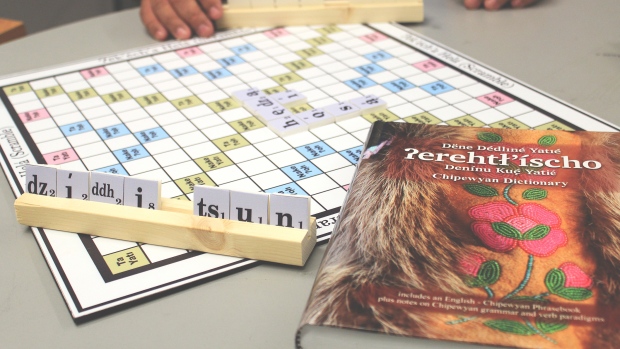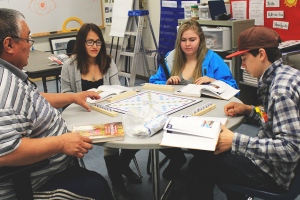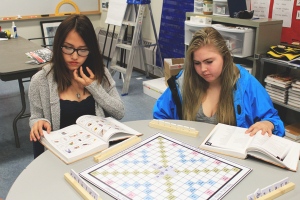 |
Canku Ota
|
 |
|
(Many Paths)
|
||
|
An Online Newsletter
Celebrating Native America
|
||
|
October 2016 - Volume
14 Number 10
|
||
|
|
||
|
Playing Scrabble
In Chipewyan: New game Helps Teach Language
|
||
|
by Mark Rendell, CBC
News
|
||
|
credits: photos submitted
by Sarah Pruys
|
|
'All the students
that want to learn their language, please do. It's very exciting'
If you think using the letter Q to nab a triple-word score is tough enough in English, try playing Scrabble in Chipewyan. That's now possible, thanks to Paul Boucher, a Chipewyan language teacher from Fort Smith, N.W.T.
Over the past year, he's developed "Scramble" or ?ëk'e´ch'a Hela´, a Chipewyan version of the popular word game. And he's bringing it into his classroom at Paul William Kaeser High School as a teaching tool. "This is an opportunity for us to take a game and translate it into a language so the kids can learn the language," says Boucher. "We've been playing it already. It's part of my activities during my lessons, I do that with the Grade 12s and I'm going to be starting to do that with my Grade 10s." Scrabble v. Scramble "It's twofold for me: they're getting to know how to use the resources we have, like the dictionaries ... [and they're] getting to use the lessons — what I taught them and the words that they've learned," says Boucher. "As they learn the game more, I will take the dictionary away. And as time goes on and they learn... how to spell and be creative and think about how the words are spelled … this will help them learn the language even faster."
Boucher says along with students, he'd also love to see his game played by fluent Chipewyan speakers. "One of my dreams is getting two people like that to play and watch them. That would be super, and for the kids to watch them, that would be even better. Because then they'll know we can do this." More games to come "One of them is just about done. And again it's involving the students and involving sentence structures, it's involving them using the tools that we have for them to learn the language," says Boucher As for his own game? "I dedicate it to all the students here. And all the students that want to learn their language, please do. It's very exciting, because [the languages are] so ancient, and to find the meaning of it: the history of our people are there." with files from Loren McGinnis |
||||||
|
|
|
|
||
|
|
||
| Canku Ota is a free Newsletter celebrating Native America, its traditions and accomplishments . We do not provide subscriber or visitor names to anyone. Some articles presented in Canku Ota may contain copyright material. We have received appropriate permissions for republishing any articles. Material appearing here is distributed without profit or monetary gain to those who have expressed an interest. This is in accordance with Title 17 U.S.C. Section 107. | ||
|
Canku Ota is a copyright ©
2000 - 2016 of Vicki Williams Barry and Paul Barry.
|
||
 |
 |
|
|
The "Canku
Ota - A Newsletter Celebrating Native America" web site and
its design is the
|
||
|
Copyright ©
1999 - 2016 of Paul C. Barry.
|
||
|
All Rights Reserved.
|
||


